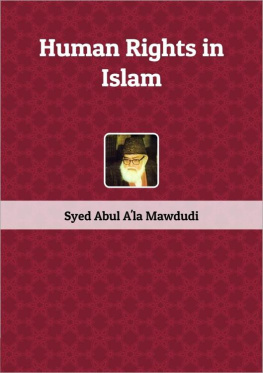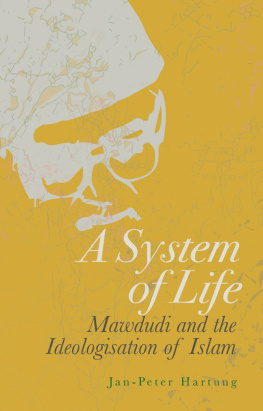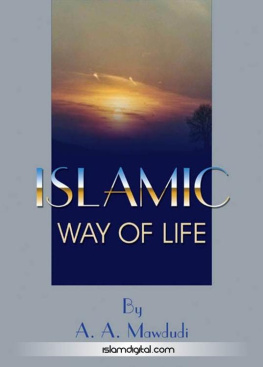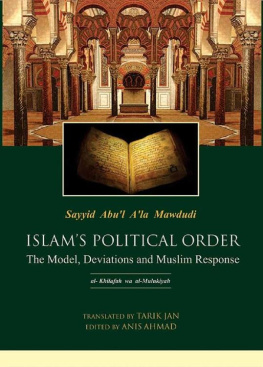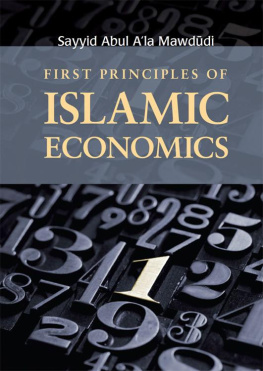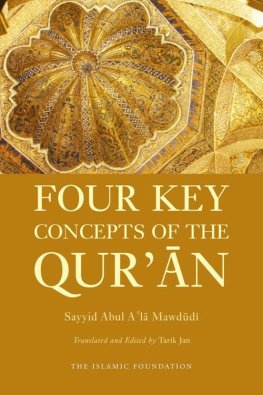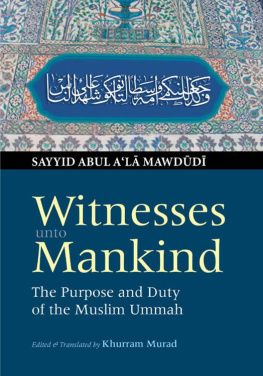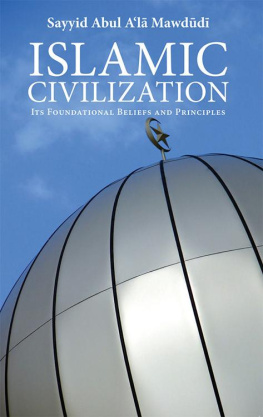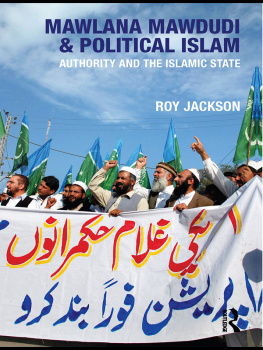Syed Abul Ala Mawdudi - Human Rights in Islam
Here you can read online Syed Abul Ala Mawdudi - Human Rights in Islam full text of the book (entire story) in english for free. Download pdf and epub, get meaning, cover and reviews about this ebook. year: 2022, publisher: UNKNOWN, genre: Religion. Description of the work, (preface) as well as reviews are available. Best literature library LitArk.com created for fans of good reading and offers a wide selection of genres:
Romance novel
Science fiction
Adventure
Detective
Science
History
Home and family
Prose
Art
Politics
Computer
Non-fiction
Religion
Business
Children
Humor
Choose a favorite category and find really read worthwhile books. Enjoy immersion in the world of imagination, feel the emotions of the characters or learn something new for yourself, make an fascinating discovery.
- Book:Human Rights in Islam
- Author:
- Publisher:UNKNOWN
- Genre:
- Year:2022
- Rating:3 / 5
- Favourites:Add to favourites
- Your mark:
- 60
- 1
- 2
- 3
- 4
- 5
Human Rights in Islam: summary, description and annotation
We offer to read an annotation, description, summary or preface (depends on what the author of the book "Human Rights in Islam" wrote himself). If you haven't found the necessary information about the book — write in the comments, we will try to find it.
Human Rights in Islam — read online for free the complete book (whole text) full work
Below is the text of the book, divided by pages. System saving the place of the last page read, allows you to conveniently read the book "Human Rights in Islam" online for free, without having to search again every time where you left off. Put a bookmark, and you can go to the page where you finished reading at any time.
Font size:
Interval:
Bookmark:
q CHAPTE R ONE : HUMAN RIGHTS, THE WEST AND ISLAM rThe Western Approach
rThe Islamic Approach
q CHAPTER TWO : BASIC HUMAN RIGHTS
r The Right to Life
rThe Right to the Safety of Life
r Respect for the Chastity of Women
rThe Right to a Basic Standard of Life
r Individual's Right to Freedom
sThe Slave Trade of Western Nations
sThe Position of Slavery in Islam
rThe Right to Justice
rEquality of Human Beings
rThe Right to Co-operate and Not to Co-operate
qCHAPTER THREE : RIGHTS OF CITIZENS IN AN ISLAMIC STATE
rThe Security of Life and Property
rThe Protection of Honor
rThe Sanctity and Security of Private Life
r The Security of Personal Freedom
rThe Right to Protest Against Tyranny
r Freedom of Expression
rFreedom of Association
rFreedom of Conscience and Conviction
rProtection of Religious Sentiments
rProtection from Arbitrary Imprisonment
rThe Right to Basic Necessities of Life
rEquality Before Law
rRulers Not Above the Law
rThe Right to Avoid Sin
r The Right to Participate in the Affairs of State
qCHAPTER FOUR : RIGHTS OF ENEMIES AT WAR
rThe Rights of the Non-Combatants
r The Rights of the Combatants
sTorture with Fire
s Protection of the Wounded
sThe Prisoner of War Should not be Slain s No one Should be Tied to be Killed
sNo Looting and Destruction in the Enemy's CountrysSanctity of Property
sSanctity of a Dead Body
sReturn of Corpses of the Enemy
sProhibition of Breach of Treaties
sRules About Declaration of War
Before I discuss the human rights in Islam I would like to explain a few points about two major approaches to the question of human rights: the Western and Islamic. This will enable us to study the issue in its proper perspective and avoid some of the confusion which normally befogs such a discussion.
The Western Approach:The people in the West have the habit of attributing every good thing to themselves and try to prove that it is because of them that the world got this blessing, otherwise the world was steeped in ignorance and completely unaware of all these benefits. Now let us look at the question of human rights. It is very loudly and vociferously claimed that the world got the concept of basic human rights from the Magna Carta of Britain; though the Magna Carta itself came into existence six hundred years after the advent of Islam. But the truth of the matter is that until the seventeenth century no one even knew that the Magna Carta contained the principles of Trial by Jury; Habeas Corpus, and the Control of Parliament on the Right of Taxation. If the people who had drafted the Magna Carta were living today they would have been greatly surprised if they were told that their document also contained all these ideals and principles. They had no such intention, nor were they conscious of all these concepts which are now being attributed to them. As far as my knowledge goes the Westerners had no concept of human rights and civic rights before the seventeenth century. Even after the seventeenth century the philosophers and the thinkers on jurisprudence though presented these ideas, the practical proof and demonstration of these concepts can only be found at the end of the eighteenth century in the proclamations and constitutions of America and France. After this there appeared a reference to the basic human rights in the constitutions of different countries. But more often the rights which were given on paper were not actually given to the people in real life. In the middle of the present century, the United Nations, which can now be more aptly and truly described as the Divided Nations, made a Universal Declaration of Human Rights, and passed a resolution against genocide and framed regulations to check it. But as you all know there is not a single resolution or regulation of the United Nations which can be enforced. They are just an expression of a pious hope. They have no sanctions behind them, no force, physical or moral to enforce them. Despite all the highsounding ambitious resolutions of the United Nations, human rights have been violated and trampled upon at different places, and the United Nations has been a helpless spectator. She is not in a position to exercise an effective check on the violation of human rights. Even the heinous crime of genocide is being perpetrated despite all proclamations of the United Nations. Right in the neighbouring country of Pakistan, genocide of the Muslims has been taking place for the last twenty- eight years, but the United Nations does not have the power and strength to take any steps against India. No action has even been taken against any country guilty of this most serious and revolting crime.
The Islamic Approach:The second point which I would like to clarify at the very outset is that when we speak of human rights in Islam we really mean that these rights have been granted by God; they have not been granted by any king or by any legislative assembly. The rights granted by the kings or the legislative assemblies, can also be withdrawn in the same manner in which they are conferred. The same is the case with the rights accepted and recognized by the dictators. They can confer them when they please and withdraw them when they wish; and they can openly violate them when they like. But since in Islam human rights have been conferred by God, no legislative assembly in the world, or any government on earth has the right or authority to make any amendment or change in the rights conferred by God. No one has the right to abrogate them or withdraw them. Nor are they the basic human rights which are conferred on paper for the sake of show and exhibition and denied in actual life when the show is over. Nor are they like philosophical concepts which have no sanctions behind them.
The charter and the proclamations and the resolutions of the United Nations cannot be compared with the rights sanctioned by God; because the former is not applicable to anybody while the latter is applicable to every believer. They are a part and parcel of the Islamic Faith. Every Muslim or administrators who claim themselves to be Muslims will have to accept, recognize and enforce them. If they fail to enforce them, and start denying the rights that have been guaranteed by God or make amendments and changes in them, or practically violate them while paying lip-service to them, the verdict of the Holy Quran for such governments is clear and unequivocal:
Those who do not judge by what God has sent down are the dis Believers (kafirun) . 5:44 The following verse also proclaims: " They are the wrong-doers (zalimun) " (5:45), while a third verse in the same chapter says: " They are the evil-livers (fasiqun) " (5:47). In other words this means that if the temporal authorities regard their own words and decisions to be right and those given by God as wrong they are disbelievers. If on the other hand they regard God's commands as right but wittingly reject them and enforce their own decisions against God's, then they are the mischief-makers and the wrong-doers. Fasiq, the law-breaker,is the one who disregards the bond of allegiance, and zalim is he who works against the truth. Thus all those temporal authorities who claim to be Muslims and yet violate the rights sanctioned by God belong to one of these two categories, either they are the disbelievers or are the wrong- doers and mischief-makers. The rights which have been sanctioned by God are permanent, perpetual and eternal. They are not subject to any alterations or modifications, and there is no scope for any change or abrogation.
Font size:
Interval:
Bookmark:
Similar books «Human Rights in Islam»
Look at similar books to Human Rights in Islam. We have selected literature similar in name and meaning in the hope of providing readers with more options to find new, interesting, not yet read works.
Discussion, reviews of the book Human Rights in Islam and just readers' own opinions. Leave your comments, write what you think about the work, its meaning or the main characters. Specify what exactly you liked and what you didn't like, and why you think so.

